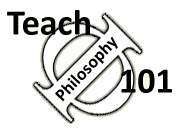Teach Philosophy 101
Free resources for
philosophy teachers!
"One of the most comprehensive, well-researched, and accessible guides for teachers that I have ever seen." James Lang, Chronicle of Higher Education (read full review of TΦ101)
Sample Syllabi
Samples of syllabi and course plans from various sources. If you have a syllabus you would like us to consider for inclusion, please send it to us.
Syllabi appropriate for an "Introduction to Philosophy" course broadly construed
-
This syllabus from Dera Sipe takes a topics based approach, covering the existence of god, questions in social/political philosophy, and ends with "questions of the individual: existentialism, freedom, and subjectivity". The readings are primarily selection from the classics/great books approach. Although the instructor has students buy books, most of the readings are avialable in the public domain.
-
Jack Russell Weinstein's (University of North Dakota) syllabus uses three different notions of dialogue in Plato (the literal conversations, Plato's dialgoue with other philosophers, and his dialogue with the students) as a framework for readings and papers in an intro course. "Three Conversations: Teaching Plato in an Introduction to Philosophy Course." Teaching Philosophy. 26.1 (2003): 3-20.
-
Russell Marcus (Hamilton College) has a fairly classic, writing intensive topics based introduction (Philosophy of religion, epistemology, philosophy of science, philosophy of mind, ethics) from 2007, as well as other resources on his website
-
John Carvalho's, Villanova University syllabus offers an interesting blending of classical sources with contemporary continental and post-modern sources.
-
Gary Bartlett provides a recent syllabus that is responsive to recent developments in AI, focusing on in class writing and the use of Perusall to insure student engagement with assigned readings. He also has a novel assignment structure which gives students options in terms of what assignments to complete.
-
Russell Marcus (Hamilton College) provides a more recent, introduction to philosophy course syllabus based on the topic of infinity that may be helpful to those who have more leeway in their introductory course design. This course makes use of a Team-based-learning design that instructors may want to model.
-
Georgi Gardiner (Tulane University) provides an introductory philosophy course syllabus that engages with philosophy through art, play, and tarot. During the semester, students visit two art galleries, an artist's studio, and a tarot archive. They also make philosophical art and design philosophy games. See the syllabus here and the Gardiner's website here.
Syllabi for an "Introduction to Ethics" course broadly construed
-
Savannah Pearlman (Howard University) provides an ethics syllabus that, similar to Bartlett, offers the "menu approach" to grading whereby students can choose which assignments they want to complete, as well as what grade they want to aim for.
-
David Sackris's (Arapahoe Community College) online course syllabus focuses on getting students to engage with the assigned readings through the use of weekly short answer questions. There is also flexibility in terms of which reading assignments students must complete. Sackris also makes use of Perusall in place of the typical online discussion board.
Problem- or Project-Based Syllabi
-
Some researchers suggest that instructors should design courses around a project, rather than around texts. Michael Strawser (University of Central Florida) assigned no texts whatsoever and asked his students to work together over the semester to create their own "introductory textbook in philosophy, complete with reading selections, commentaries, study questions, and glossary" (117). See his "Creating Philosophy: Using a Cooperative Learning Approach in the Classroom," Teaching Philosophy 28.2 (2005): 115-124.
-
Dan Werner from SUNY New Paltz has a syllabus for a course on The Meaning of Life
-
Interdisciplinary Introduction to Philosophy, based on the famous 1924 Leopold and Loeb case, using three films, two novels, a court transcript, and conventional texts. Extremely creative and provacative. Andrew P. Mills (Otterbein College). See his article "Leopold and Loeb and an Interdisciplinary Introduction to Philosophy," Teaching Philosophy. 28:1 (2005) 17-29.
Other resources
There are tons of philosophy syllabi that can be found with a quick web search. More and more instructors are also creating courses that make use of "Open Educational Resources" so that students do not have to purchase textbooks. This can be done using the article-based approach or by making using of text books and anthologies that were designed to be free, editable resources. Here are some OER resources:
-
OER resources for philosophy collected by the Open Educational Resources Initiative
-
Iowa State University has a nice collection of OER materials for philosophy
Teaching online can call for a different approach to course design, as well as call for using different materials. For additional help with creating an online course, see our Online Teaching section.
We also have additional resources. Click one of the three buttons below.
Edited on 10/13/25-David Sackris
